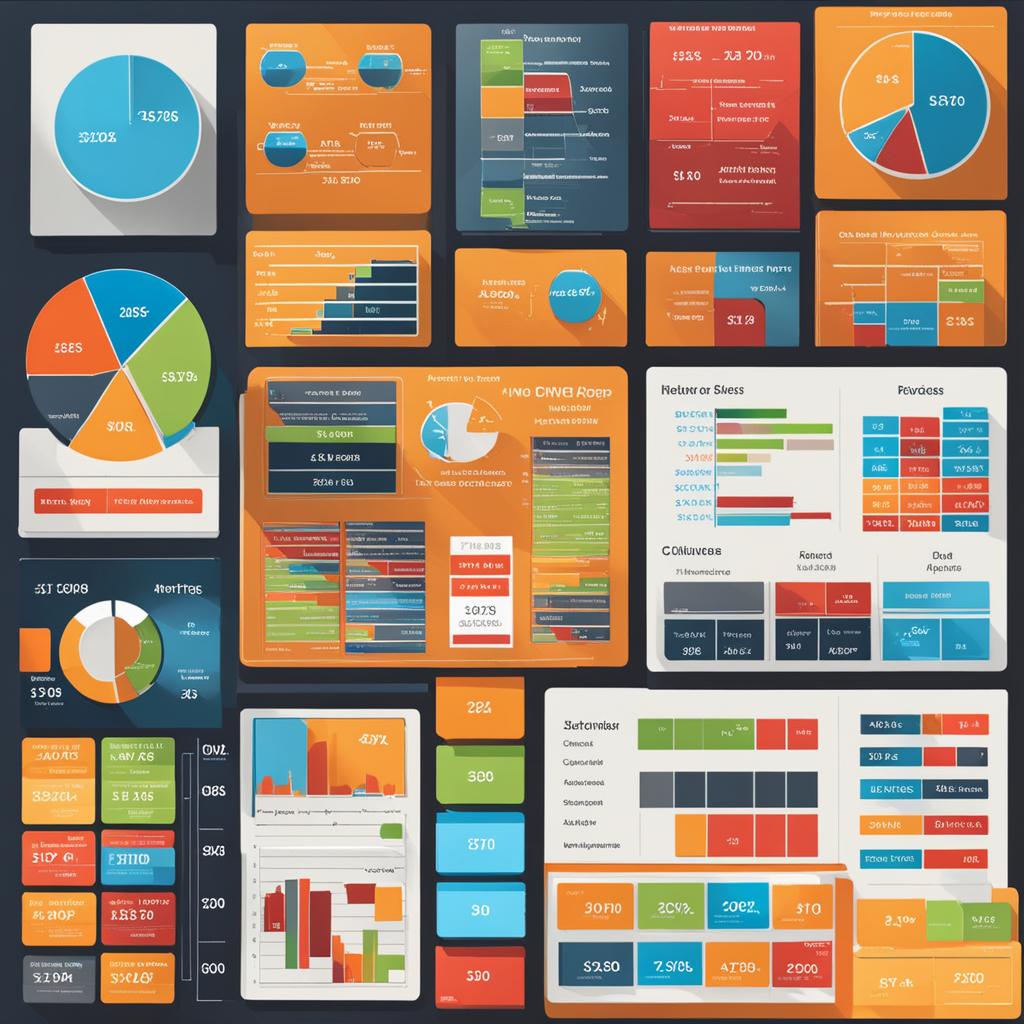Choosing the right online stock broker is crucial for beginners looking to start investing. In this guide, I will provide a list of the best brokers for beginners in September, focusing on platforms that are beginner-friendly and offer the necessary tools and resources to help new investors get started.
Key Takeaways:
- Choosing the right broker is crucial for beginner investors.
- Look for platforms that are beginner-friendly and offer the necessary tools and resources.
- Consider factors such as costs, account types, investment offerings, research and education resources, and customer support.
- Evaluate the brokers mentioned in this guide to find the one that aligns with your needs and investment goals.
- Stay tuned for the upcoming sections where we dive deeper into the different types of brokers and the top options for beginners in each category.
Understanding the Different Types of Brokers
When it comes to investing, it’s essential to have a good understanding of the different types of brokers available. Let’s explore the three main categories: full-service stock brokers, discount stock brokers, and robo-advisors.
Full-Service Stock Brokers
Full-service stock brokers offer a comprehensive range of services and products, making them a suitable choice for investors who value personalized guidance and assistance. These brokers provide financial planning, investment advice, and access to a wide variety of investment options. However, it’s important to note that full-service brokers typically charge higher fees for their services.
Discount Stock Brokers
For investors looking for lower trading commissions and fees, discount stock brokers are a more cost-effective option. They provide the opportunity to buy investments online at discounted rates, making it easier to build a diversified portfolio without incurring high costs. Discount brokers offer a self-directed approach to investing, allowing you to make your own investment decisions without the guidance of a dedicated financial advisor.
Robo-Advisors
Robo-advisors combine the benefits of technology and financial expertise, making them an attractive option for beginner investors. These platforms use algorithms to automate investment decisions based on your risk tolerance and investment goals. Robo-advisors offer a hands-off approach to investing, making it easier for individuals who may not have the time or knowledge to actively manage their investments.
Understanding the different types of brokers is the first step in choosing the right one for your investment needs. Whether you prefer personalized advice, want to minimize costs, or seek a technology-driven approach, there is a broker that can cater to your specific requirements.
Now that we have a clearer understanding of the three types of brokers, let’s compare their key features in the table below:
| Broker Type | Key Features |
|---|---|
| Full-Service Stock Brokers | Comprehensive services, financial planning, investment advice, wide variety of investment options |
| Discount Stock Brokers | Lower trading commissions and fees, self-directed investing |
| Robo-Advisors | Automated investment decisions, technology-driven approach, hands-off investing |
By comparing these features, you can determine which type of broker aligns best with your investment goals and preferences.
Top Full-Service Brokers for Beginners
If you have more money than time and are looking for a full-service broker, there are a few options that cater to beginners. These brokers provide comprehensive services, including financial planning, investing advice, and regular portfolio updates. Fidelity Investments is known for its excellent customer service and comprehensive research resources. Charles Schwab offers a full range of features and educational materials for beginners. Merrill Edge, a Bank of America company, is a good option for beginners who already have a relationship with the bank.
Fidelity Investments
Fidelity Investments is a popular choice for beginners due to its comprehensive range of services and resources. With Fidelity, you can expect:
- Excellent customer service
- Comprehensive research resources
- Financial planning services
- In-person branch locations
Whether you’re new to investing or looking for additional guidance, Fidelity can provide the support you need to make informed decisions. They offer a user-friendly platform and educational materials to help beginners get started.
Charles Schwab
Charles Schwab is another top choice for full-service brokerage services. Some features that make Charles Schwab beginner-friendly include:
- Wide range of educational materials
- Access to research reports and market insights
- Low-cost index fund options
- Mobile app for convenient trading
Charles Schwab provides a comprehensive suite of tools and resources to help beginners build their investment portfolios. Their user-friendly platform and extensive educational materials make it easier for beginners to navigate the world of investing.
Merrill Edge
Merrill Edge, a Bank of America company, is a good option for beginners who already have a banking relationship with Bank of America. Some key features of Merrill Edge include:
- Integration with Bank of America accounts
- Access to Merrill Lynch research and investment advice
- Wide range of investment options
- User-friendly platform
If you’re already a Bank of America customer, choosing Merrill Edge as your full-service broker can provide a seamless and integrated banking and investing experience. Merrill Edge offers a complete suite of investment products and services for beginners.
When choosing a full-service broker, consider your specific needs and preferences. Evaluate factors such as customer service, research resources, educational materials, investment options, and user-friendly platforms. The right full-service broker will provide the support and guidance you need to navigate the complexities of the stock market as a beginner.
https://www.youtube.com/watch?v=eEIoP9mfGhY
Top Discount Brokers for Beginners
As a beginner investor, finding a discount broker that offers affordable trading options and beginner-friendly features can help you kickstart your investment journey. Here are some top discount brokers that cater to beginners:
1. Robinhood
Robinhood is renowned for its commission-free trading, making it an appealing choice for beginners looking to minimize costs. With its user-friendly mobile app, Robinhood provides a seamless trading experience, allowing you to buy and sell stocks and ETFs with ease. The platform also offers real-time market data, basic research tools, and the option to invest in cryptocurrencies.
2. E-Trade Financial
E-Trade Financial is a popular choice among beginners due to its extensive educational materials. The platform provides a range of resources, including articles, videos, and webinars, to help new investors gain confidence and knowledge. E-Trade also offers two mobile apps, E-Trade Mobile and Power E-Trade, giving you the flexibility to trade on-the-go using your preferred device.
3. TD Ameritrade
If you’re seeking in-depth educational resources, TD Ameritrade is an excellent option. The broker provides a vast library of instructional videos, live education sessions, and immersive courses to help beginners understand the fundamentals of investing. TD Ameritrade’s thinkorswim platform offers advanced trading tools for those looking to expand their investment strategies.
4. Webull
Although Webull may be lesser-known compared to other discount brokers, it offers compelling features for beginners. Similar to Robinhood, Webull offers commission-free trades, allowing you to invest in stocks, ETFs, and options without paying trading fees. In addition, Webull provides fractional shares trading, enabling you to invest in high-priced stocks with smaller amounts of capital.
5. Ally Invest
Ally Invest is a newer player in the online brokerage space but has gained recognition for its low fees and user-friendly platform. The broker offers a simple and intuitive interface, making it easy for beginners to navigate and execute trades. Ally Invest also provides valuable research tools and educational resources to help you make informed investment decisions.
These discount brokers for beginners offer accessible platforms, affordable trading options, and educational resources to support your investment journey. Consider your specific needs and preferences when choosing the broker that aligns best with your goals. Remember, each broker has unique features and limitations, so take the time to explore and compare your options before making a decision.
Top Robo-Advisors for Beginners
If you prefer a more hands-off approach to investing, robo-advisors can be a great option. These automated platforms create and manage investment portfolios based on your risk tolerance and time horizon, making investing simpler and more accessible for beginners.
Betterment
Betterment is a top-rated robo-advisor that offers a beginner-friendly investing experience. They provide personalized investment recommendations, automatic rebalancing, and tax-efficient strategies. Betterment charges a low fee based on the amount you have invested, making it an affordable choice for beginners.
Important Factors to Consider When Choosing a Broker
Choosing the right broker is a crucial decision when starting your investing journey. There are several factors you should consider to ensure you choose a broker that meets your needs and goals.
Determine the Type of Brokerage Account
First, you need to determine the type of brokerage account you want to open. Are you interested in retirement accounts like IRAs or 401(k)s, or do you want to explore other investment options? Different brokers specialize in different account types, so it’s important to choose one that aligns with your investment goals.
Identify Your Investing Goals
Next, you need to identify your investing goals. Do you want to focus on stocks, bonds, or other types of investments? Each broker offers different investment options, so it’s essential to choose one that provides the types of investments you’re most interested in.
Consider the Types of Investments Offered
In addition to your specific investment goals, it’s important to consider the types of investments a broker offers. You want to ensure that the broker provides a wide variety of funds to choose from, including mutual funds, ETFs, index funds, and individual stocks.
| Factors to Consider When Choosing a Broker | How to Choose the Right Broker |
|---|---|
| Determine the type of brokerage account you want to open | Identify your investing goals |
| Consider the types of investments you’re interested in | Ensure the broker offers a wide variety of funds |
It’s crucial to carefully consider these factors before choosing a broker. Taking the time to evaluate your needs and goals will help you select a broker that aligns with your investment strategy.
Once you’ve considered these important factors, you’ll be able to make an informed decision and choose the right broker for your investment journey.
Evaluating Costs and Fees
When it comes to choosing a broker, it’s essential to consider the costs and fees involved. As a beginner, you want to find a broker that offers low trading commissions and account fees. This way, you can maximize your potential returns and keep more of your hard-earned money for investments.
Many of the top brokers for beginners understand the importance of cost-effective trading and offer commission-free trading on stocks and ETFs. By eliminating trading commissions, these brokers make it easier for beginners to start investing without worrying about incurring additional expenses.
“It’s crucial to evaluate the costs and fees associated with different brokers. As a beginner, every dollar saved on fees can make a significant impact on your long-term investment returns.”
However, it’s essential to look beyond trading commissions and account fees. Some brokers may have additional fees associated with their services, such as transfer-out fees or charges for specific features or tools. Make sure to consider these fees when evaluating the overall cost of using a particular broker.
To help you make a well-informed decision, here’s a table comparing the costs and fees of some top brokers for beginners:
| Broker | Trading Commissions | Account Fees | Additional Fees |
|---|---|---|---|
| Fidelity Investments | $0 | $0 | No transfer-out fees. Some optional services may have associated fees. |
| Robinhood | $0 | $0 | No transfer-out fees. Additional fees for margin trading and premium features. |
| Vanguard | $0 for Vanguard ETFs, $7 for non-Vanguard ETFs and individual stocks | $20 per year for IRA accounts (waived with certain conditions) | No transfer-out fees. Account service fees for some accounts. |
| TD Ameritrade | $0 | $0 | No transfer-out fees. Some optional services and premium features have associated fees. |
Note: These fees are subject to change. Please refer to the broker’s website for the most up-to-date information.
Comparing the costs and fees of different brokers is vital in choosing the right one for your needs. Consider your investment strategy, the frequency of trading, and the value you place on additional services and features. Remember, while low-cost brokers can be beneficial for beginners, it’s equally important to ensure that the broker’s offerings align with your investment goals and provide the necessary tools and resources for your growth.

Account Types and Investment Offerings
When selecting a broker, it’s important to consider the variety of account types and investment offerings they provide. Different brokers offer different options to cater to the diverse needs of investors.
Some brokers specialize in retirement accounts, such as Individual Retirement Accounts (IRAs) or 401(k) plans. These accounts offer tax advantages and are designed to help individuals save for retirement. Examples of brokers that specialize in retirement accounts include Fidelity, Vanguard, and Charles Schwab.
Other brokers provide a wide range of investment options, including stocks, bonds, exchange-traded funds (ETFs), and more. If you’re interested in building a diverse investment portfolio, it’s essential to choose a broker that offers a wide variety of funds to choose from. Brokers like E*TRADE, TD Ameritrade, and Interactive Brokers are known for their extensive investment offerings.
For beginners, it’s important to choose a broker that offers investments suitable for their risk tolerance and level of experience. Many brokers provide resources and tools to help beginners understand different investment options and make informed decisions.
“When it comes to investment offerings, it’s crucial to choose a broker that aligns with your investment goals and provides the necessary tools and resources to help you achieve them.”
Whether you’re interested in stocks, bonds, ETFs, mutual funds, or other investment vehicles, it’s important to evaluate the investment offerings of different brokers before making a decision.
Account Types
Brokers offer various types of accounts to meet different investment needs and goals. Some common account types include:
- Individual Brokerage Account
- Retirement Accounts (e.g., IRA, 401(k))
- Education Savings Accounts (e.g., 529 Plan)
- Joint Accounts
- Trust Accounts
The type of account you choose will depend on factors such as your investment goals, tax considerations, and desired level of control and ownership.
Investment Offerings
Brokers offer a wide range of investment opportunities to cater to different investment strategies. Some common investment offerings include:
- Stocks: Ownership shares of publicly-traded companies
- Bonds: Debt instruments issued by governments, municipalities, and corporations
- ETFs: Exchange-traded funds that track specific indexes or sectors
- Mutual Funds: Pools of money invested in a diversified portfolio of securities
- Options: Contracts that give the buyer the right to buy or sell an underlying asset at a predetermined price within a specific timeframe
These are just a few examples of the investment offerings available. Brokers may also provide access to alternative investments, like real estate investment trusts (REITs), commodities, and foreign currencies.
Remember, it’s important to assess your investment goals, risk tolerance, and investment knowledge when considering the account types and investment offerings of different brokers.
“By choosing a broker that offers the right account types and investment options for your needs, you can build a well-rounded portfolio that aligns with your financial goals.”
Now that we’ve explored the various account types and investment offerings, let’s move on to the next section, where we’ll discuss the research and education resources provided by brokers to help beginners make informed investment decisions.
| Broker | Account Types | Investment Offerings |
|---|---|---|
| Fidelity | Individual Brokerage Account, IRA, 401(k), Education Savings Accounts, Trust Accounts | Stocks, Bonds, ETFs, Mutual Funds, Options, and more |
| Vanguard | Individual Brokerage Account, IRA, 401(k), Education Savings Accounts, Trust Accounts | Stocks, Bonds, ETFs, Mutual Funds, Options, and more |
| Charles Schwab | Individual Brokerage Account, IRA, 401(k), Education Savings Accounts, Trust Accounts | Stocks, Bonds, ETFs, Mutual Funds, Options, and more |
| E*TRADE | Individual Brokerage Account, IRA, 401(k), Education Savings Accounts, Joint Accounts, Trust Accounts | Stocks, Bonds, ETFs, Mutual Funds, Options, and more |
| TD Ameritrade | Individual Brokerage Account, IRA, 401(k), Education Savings Accounts, Joint Accounts, Trust Accounts | Stocks, Bonds, ETFs, Mutual Funds, Options, and more |
Research and Education Resources
As a beginner in the world of investing, having access to comprehensive research and education resources is essential. When choosing a broker, look for platforms that offer a wide range of tools and materials to help you learn and make informed decisions. The following resources can be particularly valuable for beginners:
1. Reports and Analysis:
Brokers that provide detailed reports and analysis on various investment options can help beginners gain a deeper understanding of the market. These reports often cover factors such as company performance, industry trends, and economic outlooks, providing valuable insights to guide your investment strategy.
2. Webinars and Tutorials:
Webinars and tutorials can be an effective way for beginners to learn the fundamentals of investing. Look for brokers that offer educational webinars on topics such as portfolio diversification, risk management, and investment strategies. Tutorials can also provide step-by-step guidance on using the broker’s platform and tools.
3. Instructional Videos:
Some brokers go a step further by offering instructional videos that cover different investment concepts and strategies. These videos can be a great resource for beginners who prefer visual learning, as they provide engaging and accessible explanations of complex financial topics.
4. Live Education Sessions:
Live education sessions, such as seminars or online classes, can offer interactive learning experiences for beginners. These sessions may be led by industry experts or experienced investors who share their knowledge and insights. Taking part in live education sessions can help beginners ask questions, clarify doubts, and connect with fellow investors.
Remember that education is a continuous process in the world of investing. Take advantage of the research and educational resources provided by your chosen broker to enhance your knowledge and skills over time.
By utilizing the research and education resources offered by brokers, beginners can build a solid foundation of financial knowledge and make informed investment decisions.
Customer Support and Ease of Use
When it comes to choosing a broker as a beginner, customer support and the ease of use of their platforms are crucial factors to consider. As you embark on your investment journey, you want to ensure that you have access to reliable customer support channels in case you have any questions or encounter any issues.
Look for brokers that offer multiple communication options such as phone, chat, or email support. Having various avenues to reach out and receive assistance gives you the peace of mind that you won’t be left stranded if you need help.
Additionally, user-friendly platforms can make a big difference, especially for beginners who may not be familiar with complex trading interfaces. An intuitive and easy-to-navigate platform can simplify the process of placing trades, managing your account, and accessing research and educational resources.
Whether you prefer trading on a desktop platform or through a mobile app, prioritize brokers that provide a seamless and user-friendly experience. A platform with a clean and intuitive design can help you navigate the world of investing with confidence and convenience.
Having customer support and user-friendly platforms at your fingertips is essential as a beginner. It ensures that you have the necessary support and tools to navigate the world of investing smoothly as you embark on your financial journey.
Minimum Balance and Account Opening Requirements
When opening an account with a broker, it’s important to consider the minimum balance requirements and account opening requirements. Some brokers require a minimum balance to open an account, while others have no such requirement.
If you have a limited budget, it’s essential to choose a broker that aligns with your financial situation. Look for brokers that offer no minimum balance requirement or have a low minimum balance requirement that you can comfortably meet. This ensures that you can start investing without straining your finances.
In addition to the minimum balance, it’s crucial to check the account opening requirements of each broker. These requirements may vary from broker to broker and may include age restrictions, citizenship/residency requirements, and documentation such as proof of identity and address.
Some common account opening requirements include:
- Proof of identity – such as a valid government-issued ID
- Proof of address – such as a utility bill or bank statement
- Social security number or taxpayer identification number
By reviewing the account opening requirements beforehand, you can ensure that you have all the necessary information and documents ready for a smooth account opening process.
Choosing the Right Broker for Your Needs
When considering the minimum balance and account opening requirements, it’s essential to find a broker that meets your specific needs and preferences. Factors such as fees, investment options, research tools, and customer support should also be taken into account.
Now, let’s take a look at a comparison table of brokers, their minimum balance requirements, and account opening requirements:
| Broker | Minimum Balance Requirement | Account Opening Requirements |
|---|---|---|
| Fidelity Investments | No minimum balance requirement |
|
| Robinhood | No minimum balance requirement |
|
| E-Trade Financial | No minimum balance requirement |
|
| TD Ameritrade | No minimum balance requirement |
|
Note: The above table provides a general overview and may not include all possible brokers. It’s important to conduct thorough research and review the specific requirements of each broker before opening an account.
By considering the minimum balance and account opening requirements, you can find a broker that suits your financial situation and easily navigate through the account opening process.

Best Brokers for Mobile Investing
Mobile investing has revolutionized the way we manage our investments, allowing us to trade, monitor our portfolios, and access educational resources on the go. Many brokers have recognized the importance of mobile trading and have developed user-friendly mobile apps to cater to the needs of today’s investors. Here are a few brokers known for their excellent mobile platforms:
- Robinhood: Robinhood’s mobile app is known for its simplicity and commission-free trading. With a clean interface and intuitive design, it’s a popular choice for mobile investors.
- SoFi Active Investing: SoFi Active Investing offers a mobile app that provides a seamless and user-friendly trading experience. It also offers features like automated investing and fractional shares.
- Charles Schwab: Charles Schwab’s mobile app is highly regarded for its comprehensive functionality and robust trading tools. It allows investors to execute trades, track the market, and access research and educational resources.
With mobile investing, you can stay connected to the markets and manage your investments anytime, anywhere. These brokers offer mobile trading apps that bring the power of investing right to your fingertips.
Investing on the Go
The rise of mobile investing has transformed the way people approach the financial markets. With mobile trading apps, you can:
- Trade stocks, ETFs, and other securities with ease.
- Monitor your portfolio and track performance in real-time.
- Access a wide range of research and educational resources.
- Set up push notifications to stay informed about market trends and news.
- Execute trades quickly and securely.
Whether you’re a seasoned investor or just starting out, the convenience and accessibility of mobile investing apps make it easier than ever to engage with the financial markets.
Mobile investing apps have revolutionized the way we trade and manage our portfolios. With just a few taps on your smartphone, you can execute trades, monitor your investments, and access a wealth of information. It’s like having a brokerage firm in your pocket.
Best Brokers for Retirement Investors
If retirement accounts are your main priority, it’s essential to choose brokers that specialize in retirement investing. These brokers understand the unique needs and goals of retirement investors and offer a wide range of retirement account options to help you plan for a comfortable future.
Three top choices for retirement investors are Fidelity, Vanguard, and Charles Schwab. These brokers have established themselves as industry leaders and have built a reputation for providing exceptional retirement investment services.
Fidelity
Fidelity is known for its extensive selection of retirement accounts, including Individual Retirement Accounts (IRAs), 401(k) plans, and Roth IRAs. They provide a wide range of investment options, including mutual funds, stocks, bonds, and exchange-traded funds (ETFs). Fidelity offers comprehensive research and educational resources to help retirement investors make informed decisions. Their retirement planning tools and calculators can assist in determining the best strategies to achieve your retirement goals.
Vanguard
Vanguard is highly regarded for its low-cost retirement investment options. They offer a variety of retirement accounts, including Traditional and Roth IRAs, Simplified Employee Pension (SEP) IRAs, and Individual 401(k) plans. Vanguard’s focus on index funds and low-cost ETFs makes it an attractive choice for retirement investors looking for low expense ratios and long-term investment strategies. With a commitment to delivering strong investment performance and long-term growth, Vanguard is a popular option among retirement investors.
Charles Schwab
Charles Schwab is known for its comprehensive retirement planning services and support. They offer a range of retirement accounts, including Traditional and Roth IRAs, individual and small business 401(k) plans, and self-employed 401(k) plans. Charles Schwab provides retirement investors with access to a wide variety of investment options, including mutual funds, stocks, bonds, and ETFs. Their robust research and educational resources help retirement investors stay informed and make well-informed decisions about their retirement portfolios.
When choosing a broker for retirement investing, it’s crucial to consider factors such as account options, investment choices, fees, research resources, and customer support. The table below provides a summary of the key features and offerings from Fidelity, Vanguard, and Charles Schwab:
| Broker | Retirement Account Options | Investment Choices | Research Resources | Customer Support |
|---|---|---|---|---|
| Fidelity | IRAs, 401(k) plans, Roth IRAs | Mutual funds, stocks, bonds, ETFs | Comprehensive research tools and educational resources | 24/7 customer support |
| Vanguard | Traditional and Roth IRAs, SEP IRAs, Individual 401(k) plans | Index funds, low-cost ETFs | Extensive research and educational materials | 24/7 customer support |
| Charles Schwab | Traditional and Roth IRAs, 401(k) plans | Mutual funds, stocks, bonds, ETFs | Robust research tools and educational resources | 24/7 customer support |
Choosing the right broker for retirement investing is essential for building a secure financial future. Evaluate the features, benefits, and investment options offered by Fidelity, Vanguard, and Charles Schwab to determine which one aligns with your retirement goals and preferences.

Best Brokers for DIY Investors
As a DIY investor who prefers to make your own investment decisions, it’s important to find brokers that provide comprehensive tools and resources to support your self-directed investing journey. Here are three top brokers known for their platforms that offer advanced trading features and extensive research materials:
- E*TRADE: E*TRADE is a popular choice for DIY investors due to its robust trading platform and wide range of investment options. Their Power E*TRADE platform offers advanced tools for charting, technical analysis, and customizable screeners, allowing you to conduct in-depth research and analysis for your investment decisions.
- Fidelity: Fidelity is another excellent option for DIY investors who want access to a variety of investment choices and research materials. Fidelity’s Active Trader Pro platform provides advanced trading capabilities, including real-time data streaming, customizable charting tools, and sophisticated options trading features to cater to experienced investors.
- TD Ameritrade: TD Ameritrade offers a comprehensive suite of trading tools and resources through its thinkorswim platform. With thinkorswim, DIY investors can access advanced charting features, immersive trading simulations, and a wide range of educational materials, including webcasts and tutorials, to enhance their self-directed investment strategies.
These brokers understand the needs of DIY investors and provide the necessary tools and resources to help you make informed investment decisions. Whether you’re interested in analyzing technical indicators, conducting thorough fundamental analysis, or exploring options trading strategies, these brokers have you covered.
Remember, as a DIY investor, it’s important to stay informed and continuously educate yourself about market trends, investment strategies, and risk management techniques. These brokers offer a wealth of research materials and educational resources to support your growth and development as a self-directed investor.
Now let’s take a closer look at the offerings of these brokers in the table below:
| Broker | Trading Platform | Advanced Tools | Research Materials |
|---|---|---|---|
| E*TRADE | Power E*TRADE | Advanced charting, technical analysis, customizable screeners | Extensive research library, analyst research reports, market insights |
| Fidelity | Active Trader Pro | Real-time data streaming, customizable charting tools, sophisticated options trading | Comprehensive research reports, third-party research, educational webinars |
| TD Ameritrade | thinkorswim | Advanced charting, immersive trading simulations, options trading features | Diverse range of educational materials, webcasts, tutorials |
With these brokers and their powerful trading platforms, advanced tools, and extensive research materials, DIY investors like you can confidently steer your investment journey and make well-informed decisions.
Best Brokers for Low-Cost Index Investing
If you’re an index fund investor looking for low-cost investing options, consider brokers like Vanguard and Charles Schwab. These reputable brokers offer a wide selection of low-cost index funds and prioritize providing competitive fees and comprehensive index investing options.
Index funds are a popular investment choice for long-term strategies due to their low fees and broad market exposure. By tracking a specific index, such as the S&P 500, index funds aim to replicate its performance, making them a passive investment option for investors seeking market returns.
Vanguard: Vanguard is well-known for its commitment to low-cost investing and offers a broad range of index funds with expense ratios that consistently rank among the lowest in the industry. With a wide selection of index funds covering various asset classes and investment strategies, Vanguard allows investors to easily diversify their portfolios at a low cost.
Charles Schwab: Charles Schwab is another brokerage firm that caters to low-cost index investing. They offer a diverse range of index funds, including their own Schwab Index Funds, which have expense ratios competitive with industry leaders. In addition, Charles Schwab provides comprehensive research and educational resources to help investors make informed decisions about their index fund investments.
When choosing a broker for low-cost index investing, it’s important to consider factors such as expense ratios, fund selection, and the overall quality of customer service and support. By selecting a broker like Vanguard or Charles Schwab, you can gain access to a wide variety of low-cost index funds that can be a valuable component of your investment portfolio.
Conclusion
Choosing the best broker for beginners is a crucial step towards starting your investment journey. It’s important to consider several factors before making a decision. First, evaluate the costs and fees associated with each broker, as low-cost options can significantly impact your long-term returns. Next, consider the account types and investment offerings that align with your investment goals. Look for brokers that offer a diverse range of investment options, including stocks, bonds, ETFs, and more.
Furthermore, research and education resources play a vital role in the learning process. Opt for brokers that provide comprehensive tools, reports, webinars, and tutorials to help you enhance your investing knowledge. Additionally, prioritize customer support and ease of use, as reliable assistance and user-friendly platforms can make your investing experience smoother.
After evaluating the brokers mentioned in this guide, you’ll be better equipped to choose the one that suits your needs and goals. Consider your preferences for costs, account types, research resources, support, and usability. Remember, finding the best broker for beginners is an individual decision that requires careful consideration. Start your investment journey with confidence and choose the broker that aligns perfectly with your vision for financial growth.
FAQ
What are the best online stock brokers for beginners in September?
The best online stock brokers for beginners in September are Fidelity Investments, Charles Schwab, Merrill Edge, Robinhood, E-Trade Financial, TD Ameritrade, Webull, Betterment, and Wealthfront.
What are the different types of brokers available?
The different types of brokers available are full-service stock brokers, discount stock brokers, and robo-advisors.
Which are the top full-service brokers for beginners?
The top full-service brokers for beginners are Fidelity Investments, Charles Schwab, and Merrill Edge.
Which are the top discount brokers for beginners?
The top discount brokers for beginners are Robinhood, E-Trade Financial, TD Ameritrade, and Webull.
Which are the top robo-advisors for beginners?
The top robo-advisors for beginners are Betterment and Wealthfront.
What factors should one consider when choosing a broker?
Factors to consider when choosing a broker include account types, investment offerings, research and education resources, customer support, and ease of use.
How do I evaluate the costs and fees of a broker?
To evaluate the costs and fees of a broker, consider trading commissions, account fees, transfer-out fees, and fees for additional services.
What types of account and investment options should beginners look for?
Beginners should look for brokers that offer a wide range of account types and investment options, including stocks, bonds, ETFs, and more.
What research and education resources should beginners prioritize?
Beginners should prioritize brokers that offer comprehensive research reports, webinars, tutorials, instructional videos, and live education sessions to help them learn more about investing.
What should beginners consider when it comes to customer support and ease of use?
Beginners should choose brokers that offer reliable customer support channels and user-friendly platforms, such as phone, chat, email, desktop platforms, or mobile apps.
Are there any minimum balance or account opening requirements for brokers?
Some brokers require a minimum balance to open an account, while others have no minimum balance requirement. Beginners should check the account opening requirements and ensure that they meet the necessary criteria.
What are the best brokers for mobile investing?
The best brokers for mobile investing are Robinhood, SoFi Active Investing, and Charles Schwab, known for their excellent mobile platforms and apps.
What are the best brokers for retirement investors?
The best brokers for retirement investors are Fidelity, Vanguard, and Charles Schwab, offering a wide range of retirement account options and comprehensive research and educational resources.
What are the best brokers for DIY investors?
The best brokers for DIY investors are E*TRADE, Fidelity, and TD Ameritrade, known for their comprehensive tools, advanced trading features, and extensive research materials.
What are the best brokers for low-cost index investing?
The best brokers for low-cost index investing are Vanguard and Charles Schwab, offering a wide selection of low-cost index funds and comprehensive index investing options.
Our Friends
- https://www.bankrate.com/investing/best-online-brokers-for-beginners/
- https://www.fool.com/the-ascent/buying-stocks/best-online-stock-brokers-beginners/
- https://www.nerdwallet.com/best/investing/online-brokers-for-beginners
Money posts:
 What is a Broker-Dealer? (2024)
What is a Broker-Dealer? (2024)
 Interactive Brokers Review (2024)
Interactive Brokers Review (2024)
 18 Best Online Brokers & Stock Trading Platforms (2024)
18 Best Online Brokers & Stock Trading Platforms (2024)
 21 Best Investment Accounts for Any Investor (2024)
21 Best Investment Accounts for Any Investor (2024)
 16 Best Discount Brokers of September 2024
16 Best Discount Brokers of September 2024
 25 Best Stock Trading & Investment Apps for Beginners (2024)
25 Best Stock Trading & Investment Apps for Beginners (2024)
 Leaving Robinhood? 9 Robinhood Alternatives That Are (2024)
Leaving Robinhood? 9 Robinhood Alternatives That Are (2024)
 9 Best Penny Stock Trading Apps in 2024
9 Best Penny Stock Trading Apps in 2024


